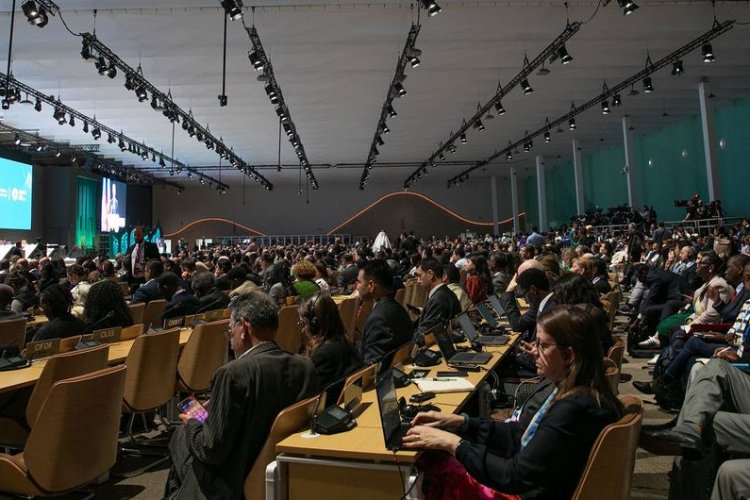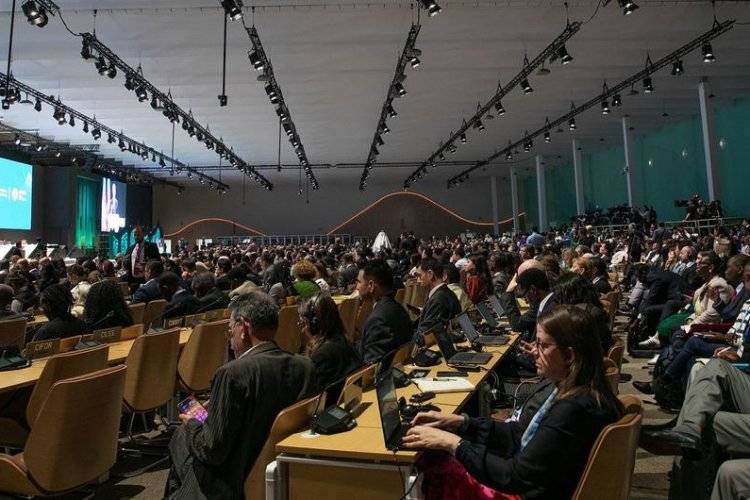Main Points In Hindi (मुख्य बातें – हिंदी में)
-
विकसित देशों की प्रतिक्रिया: 29वें संयुक्त राष्ट्र जलवायु सम्मेलन (सीओपी29) में विकसित देशों ने जलवायु कार्रवाई के लिए सालाना 300 अरब डॉलर देने का वादा किया, जो विकासशील देशों द्वारा मांगे गए 1 ट्रिलियन डॉलर से बहुत कम है।
-
अपर्याप्त समझौता: कई कमजोर देशों ने इस समझौते को अपर्याप्त बताते हुए आलोचना की है, और छोटे द्वीप राष्ट्रों ने बढ़ते जलवायु संकट के कारण अपनी चिंताओं को उजागर किया।
-
संयुक्त राष्ट्र महासचिव की टिप्पणी: संयुक्त राष्ट्र महासचिव एंटोनियो गुटेरेस ने समझौते को एक प्रारंभिक बिंदु मानते हुए इसकी सीमित महत्वाकांक्षा पर आलोचना की और अधिक मजबूत परिणामों की आवश्यकता व्यक्त की।
-
व्यक्तिगत प्राथमिकता का अभाव: विकासशील देशों के प्रतिनिधियों ने 300 अरब डॉलर के वादे को "मामूली" बताते हुए वाकआउट किया, जो वैश्विक उत्तर और दक्षिण के बीच गहरे विभाजन को रेखांकित करता है।
- भविष्य की दिशा: सम्मेलन के परिणामों के बावजूद, कुछ प्रतिनिधियों ने इस सौदे के संभावित लाभ पर जोर दिया, और COP30 में जलवायु एजेंडे को आगे बढ़ाने की आवश्यकता को महत्वपूर्ण बताया।
Main Points In English(मुख्य बातें – अंग्रेज़ी में)
Here are the main points regarding the outcomes of the 29th United Nations Climate Conference (COP29):
-
Funding Disparity: Developed nations pledged $300 billion annually for climate action, significantly lower than the $1 trillion requested by developing countries. The agreement also set a long-term climate finance goal of $1.3 trillion by 2035, which many vulnerable nations deemed insufficient to address the escalating climate crisis.
-
Contentious Negotiations: The conference, held in Baku, concluded after two weeks of intense negotiations, resulting in several key agreements, including new rules for a global carbon market and an increased focus on gender issues in climate policy. However, the disparity in funding promises led to dissatisfaction among developing countries, highlighting divisions between the global North and South.
-
Criticism from Vulnerable Nations: Representatives from small island states and least developed countries expressed their frustrations over the insufficient funding. They highlighted the existential threats posed by rising seas and emphasized that the pledged amounts reflect only a fraction of what is necessary to prevent climate disasters.
-
Mixed Reactions: While UN Secretary-General António Guterres acknowledged the agreement’s importance, he criticized its limited ambitions, urging for stronger commitments that need to be converted into actionable funding. Some delegations, however, pointed to the potential for private sector investment, suggesting the agreement could still help achieve the $1.3 trillion target.
- Call for Collective Action: Looking ahead to COP30 in Belém, Brazil, climate leaders stressed the need for enhanced ambition, unity, and action. The outcomes of COP29 underline the critical need for a robust and cohesive response to the growing climate crisis, as nations are urged to double their efforts in implementing the commitments made.


Complete News In Hindi(पूरी खबर – हिंदी में)
29वां संयुक्त राष्ट्र जलवायु सम्मेलन (सीओपी29) रविवार तड़के विवाद में समाप्त हो गया क्योंकि विकसित देशों ने जलवायु कार्रवाई के लिए सालाना 300 अरब डॉलर देने का वादा किया, जो विकासशील देशों द्वारा मांगे गए 1 ट्रिलियन डॉलर से काफी कम है। जबकि समझौते में 2035 तक $1.3 ट्रिलियन का दीर्घकालिक जलवायु वित्त लक्ष्य निर्धारित किया गया है, कई कमजोर देशों ने बढ़ते जलवायु संकट को संबोधित करने के लिए इस समझौते को अपर्याप्त बताया है।
29वां संयुक्त राष्ट्र जलवायु सम्मेलन (सीओपी29) रविवार तड़के विवाद में समाप्त हो गया क्योंकि विकसित देशों ने जलवायु कार्रवाई के लिए सालाना 300 अरब डॉलर देने का वादा किया, जो विकासशील देशों द्वारा मांगे गए 1 ट्रिलियन डॉलर से काफी कम है। जबकि समझौते में 2035 तक $1.3 ट्रिलियन का दीर्घकालिक जलवायु वित्त लक्ष्य निर्धारित किया गया है, कई कमजोर देशों ने बढ़ते जलवायु संकट को संबोधित करने के लिए इस समझौते को अपर्याप्त बताया है।
दो सप्ताह की गहन बातचीत के बाद, बाकू के विशाल स्टेडियम में आयोजित सम्मेलन कई प्रमुख समझौतों को अपनाने के साथ संपन्न हुआ, जिसमें उत्सर्जन व्यापार को सुविधाजनक बनाने के लिए वैश्विक कार्बन बाजार के लिए नए नियम और जलवायु नीति में लैंगिक मुद्दों पर विस्तारित फोकस शामिल है।
100 अरब डॉलर के ख़त्म हो रहे वार्षिक लक्ष्य की जगह नया सामूहिक परिमाणित लक्ष्य (एनसीक्यूजी) शिखर सम्मेलन का केंद्र बिंदु था। हालाँकि, विकासशील देशों ने “मामूली” फंडिंग प्रतिज्ञा पर नाराजगी व्यक्त की। छोटे द्वीप राज्यों के गठबंधन (एओएसआईएस) और अल्प-विकसित देशों के प्रतिनिधियों ने वार्ता के अंतिम दिनों के दौरान वाकआउट किया, जो वैश्विक उत्तर और दक्षिण के बीच गहरे विभाजन को रेखांकित करता है।
संयुक्त राष्ट्र महासचिव एंटोनियो गुटेरेस ने समझौते के महत्व को स्वीकार किया लेकिन इसकी सीमित महत्वाकांक्षा की आलोचना की। “यह सौदा एक शुरुआती बिंदु है, लेकिन मुझे वित्त और शमन दोनों पर अधिक मजबूत परिणाम की उम्मीद थी। प्रतिबद्धताओं को जल्द ही नकदी में बदलना चाहिए, और हमें इस लक्ष्य के उच्च अंत को पूरा करने के लिए सामूहिक कार्रवाई की आवश्यकता है, ”उन्होंने कहा।
संयुक्त राष्ट्र जलवायु परिवर्तन के कार्यकारी सचिव साइमन स्टिल ने इस सौदे को “मानवता के लिए एक बीमा पॉलिसी” के रूप में संदर्भित किया, इस बात पर जोर दिया कि इसकी सफलता समय पर और पूर्ण कार्यान्वयन पर निर्भर करती है। उन्होंने कहा, “यह समझौता स्वच्छ ऊर्जा परिवर्तन को बढ़ावा देगा और अरबों लोगों की जान की रक्षा करेगा, लेकिन किसी भी बीमा की तरह, यह केवल तभी काम करता है जब प्रीमियम का भुगतान किया जाता है।”
कमज़ोर राष्ट्रों में असंतोष
विकासशील देश अपनी निराशा पर एकमत थे। भारत ने 300 अरब डॉलर की प्रतिज्ञा को अपर्याप्त बताते हुए इसकी आलोचना की, इसके प्रतिनिधि ने कहा, “यह राशि इस विश्वास को प्रेरित नहीं करती है कि हम जलवायु परिवर्तन के गंभीर खतरे का समाधान कर सकते हैं।”
छोटे द्वीप राष्ट्रों, जिनमें से कुछ को बढ़ते समुद्र के कारण अस्तित्व संबंधी खतरों का सामना करना पड़ रहा है, ने निराशा व्यक्त की। विकसित और विकासशील देशों के बीच जलवायु भेद्यता और प्रतिक्रिया क्षमता में भारी असमानताओं पर प्रकाश डालते हुए एक प्रतिनिधि ने घोषणा की, “हम सचमुच डूब रहे हैं।”
सिएरा लियोन के प्रतिनिधित्व वाले अफ्रीकी देशों ने इन भावनाओं को दोहराया, और इस सौदे को अमीर देशों द्वारा “बुरे विश्वास का संकेत” बताया। उन्होंने तर्क दिया कि सहमत राशि जलवायु आपदा को रोकने के लिए आवश्यक धन का केवल एक अंश दर्शाती है।
आगे का रास्ता
आलोचना के बावजूद, कुछ प्रतिनिधिमंडलों ने सौदे की क्षमता पर जोर दिया। यूरोपीय संघ के एक प्रतिनिधि ने निजी क्षेत्र के निवेश का लाभ उठाने के अवसर पर प्रकाश डालते हुए कहा, “यह समझौता बहुत जरूरी निजी वित्तपोषण लाएगा और 1.3 ट्रिलियन डॉलर के लक्ष्य को हासिल करने में मदद करेगा।”
आगे देखते हुए, ब्राजील के बेलेम में COP30, जलवायु एजेंडे को आगे बढ़ाने के लिए एक महत्वपूर्ण क्षण होने वाला है। स्टिल ने राष्ट्रों से “अपने प्रयासों को दोगुना करने” और बाकू में की गई प्रतिबद्धताओं को लागू करने पर ध्यान केंद्रित करने का आग्रह किया।
जैसे-जैसे दुनिया तेजी से बढ़ते जलवायु संकट से जूझ रही है, COP29 के नतीजे जलवायु परिवर्तन के खिलाफ लड़ाई में अधिक महत्वाकांक्षा, एकता और कार्रवाई की आवश्यकता को रेखांकित करते हैं।
Complete News In English(पूरी खबर – अंग्रेज़ी में)



29th United Nations Climate Conference (COP29) concluded early Sunday amidst controversy as developed countries promised to provide $300 billion annually for climate action, which is significantly less than the $1 trillion requested by developing nations. Although the agreement set a long-term climate finance goal of $1.3 trillion by 2035, many vulnerable countries deemed the deal insufficient to address the escalating climate crisis.
The 29th United Nations Climate Conference (COP29) ended early Sunday in controversy as developed nations committed to providing $300 billion annually for climate action, which falls far short of the $1 trillion demanded by developing nations. While the agreement set a long-term climate finance goal of $1.3 trillion by 2035, many vulnerable countries criticized it as inadequate for tackling the growing climate crisis.
Following two weeks of intense negotiations, the conference held in a large stadium in Baku ended with the adoption of several key agreements, including new rules for a global carbon market to facilitate emissions trading and enhanced focus on gender issues in climate policy.
The new collective quantified goal (NCQG) replaced the old $100 billion annual target and was a focal point of the summit. However, developing countries expressed frustration at what they termed “modest” funding pledges. Representatives from the Alliance of Small Island States (AOSIS) and least developed countries walked out during the final days of talks, highlighting the deep divide between the Global North and South.
UN Secretary-General Antonio Guterres acknowledged the importance of the agreement but criticized its limited ambition. “This deal is a starting point, yet I expected stronger outcomes on finance and mitigation. Commitments must soon be turned into cash, and we need collective action to meet the upper end of this goal,” he stated.
Simon Steele, Executive Secretary of the UN Climate Change, referred to the agreement as “an insurance policy for humanity,” emphasizing that its success depends on timely and full implementation. He noted, “This agreement will promote a transition to clean energy and protect the lives of billions, but like any insurance, it only works if the premiums are paid.”
Dissatisfaction Among Vulnerable Nations
Developing countries were united in their disappointment. India criticized the $300 billion commitment as insufficient, stating, “This amount does not inspire confidence that we can solve the serious threats of climate change.”
Small island nations, some facing existential threats from rising sea levels, also expressed frustration. A representative mentioned, highlighting the vast disparities in climate vulnerability and response capacity between developed and developing nations, “We are literally sinking.”
African countries, represented by Sierra Leone, echoed these sentiments, describing the deal as a “bad faith signal” from wealthy nations. They argued that the agreed amount represents only a fraction of the funds needed to prevent climate disaster.
Looking Ahead
Despite the criticism, some delegations emphasized the deal’s potential. A representative from the European Union highlighted opportunities to leverage private sector investment, stating, “This agreement will bring much-needed private financing and help achieve the $1.3 trillion goal.”
Looking ahead, COP30 in Belem, Brazil, is expected to be a critical moment for advancing the climate agenda. Steele urged nations to “double their efforts” and focus on implementing the commitments made in Baku.
As the world grapples with an increasingly urgent climate crisis, the outcomes of COP29 underscore the need for greater ambition, unity, and action in the fight against climate change.








